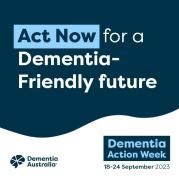Dementia action week is from Monday 18 September to 24 September 2023, with world Alzheimer’s Day on Thursday 21 September. MND can cause changes to cognition and behaviour. For some people with MND these changes are mild, and for others changes can be more severe. Prompting a diagnosis of Motor Neurone Disease with Frontotemporal Dementia, also known as MND/FTD.
This year the theme for dementia action week is Act Now for a Dementia Friendly Future. Together we can reduce the stigma and discrimination experienced by people living with dementia and their carers by raising awareness and advocating for more support and better systems for people with dementia to live well in their community, for longer.
Dementia Australia host events in a range of locations on topics about grief, loss and dementia, understanding younger onset dementia, future planning and much more.
Over 50% of people with MND will experience cognitive and behavioural changes. Most will experience relatively mild changes. For around 10-15% changes will be more severe.
When the changes are more severe, the person may receive a diagnosis of Motor Neurone Disease with Frontotemporal Dementia, also known as MND/FTD.
Your GP, neurologist or MND Clinic can help with diagnosing changes in cognition and behaviour. A neuropsychologist can also assist with diagnosis and implementing strategies to manage symptoms.
Cognitive and Behavioural Change in MND
Over 50% of people with MND will experience cognitive and behavioural changes. Most will experience relatively mild changes. For around 10-15% changes will be more severe.
When the changes are more severe, the person may receive a diagnosis of Motor Neurone Disease with Frontotemporal Dementia, also known as MND/FTD.
Your GP, neurologist or MND Clinic can help with diagnosing changes in cognition and behaviour. A neuropsychologist can also assist with diagnosis and implementing strategies to manage symptoms.
Examples of cognitive and behavioral changes
Cognition
Changes to cognition relates to intellectual abilities and thinking skills, and may include:
- Difficulty paying attention and concentrating.
- Changes in memory and the ability to recall information.
- Changes in the ability to learn new things, like a new driving route or cooking recipe.
- Difficultly adapting to change in routine.
- Changes in social cognition skills and difficultly with emotional recognition or interacting in a social environment.
Language
Sometimes changes in cognition can cause changes to language and speech, including:
- Difficulty finding the right word to say.
- Requiring more effort and time to speak.
- Unusual speech patterns, using odd words or repeating words.
- Difficulty naming objects.
Behaviour
Changes in behaviour may include:
- Feeling apathetic or losing interest in daily tasks or things otherwise enjoyed.
- Being impulsive or adopting repetitive behaviours.
- Changes to food preferences, like eating in a particular way or only eating one type of food.
Emotional lability
Also known as pseudobulbar palsy/affect, emotional lability is involuntary emotional expression and may be sudden and uncontrolled laughing or crying often without an emotional trigger.
New learning module on the MND Hub: Emotional and behavioural changes in MND
If you would like to know more about MND and emotional and behavioural changes check out the new learning module on our MND Hub.
You will learn about cognitive, emotional and behvioural changes and MND/FTD. The module explains the differences between emotional lability, depression and other changes and will link you with further resources.
Modules on our MND Hub are cost free for people living with MND, their families and carers.
Visit the MND Hub today.
Find out more
- Dementia Australia website and events page.
- National dementia helpline 1800 100 500
- Dementia Behaviour Management Advisory Service 1800 699 799
- The MND Connect website includes information for people living with MND as well as informaiton for health professionals.
- You can also contact us on 1800 777 175.




